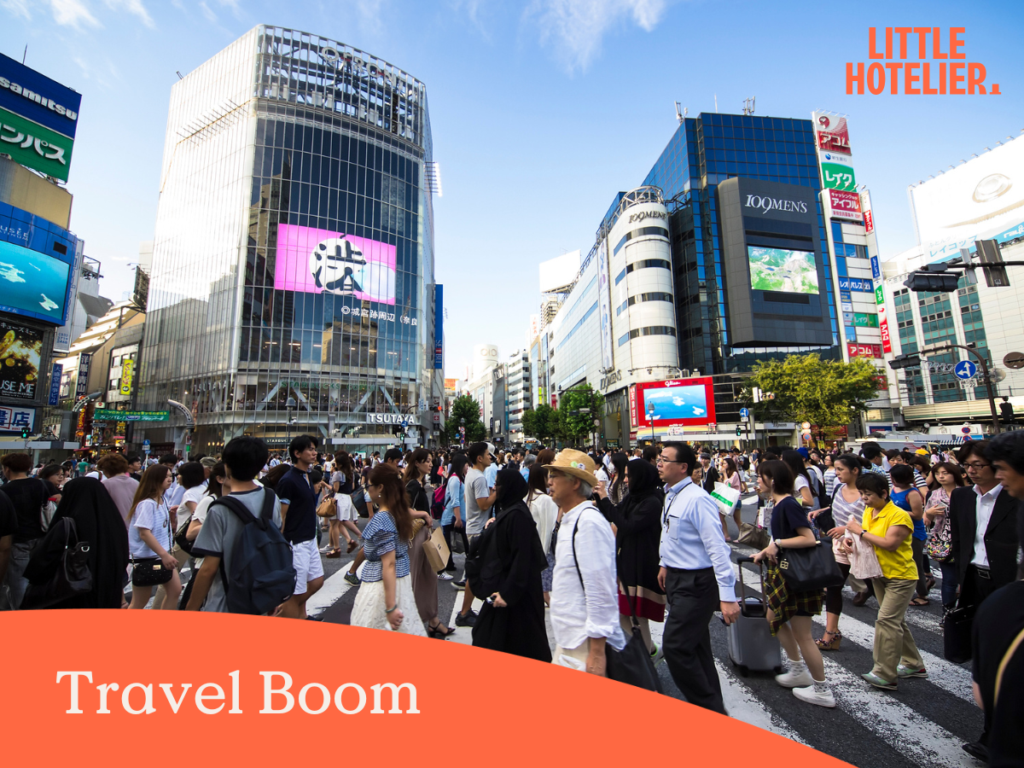What is a travel boom?
A travel boom is a surge in tourism activity that can be driven by a number of factors: pent-up demand following travel restrictions, increased disposable incomes, social media influence, or dedicated efforts by governments to attract travellers.
Hotels are on the receiving end of travel booms, meaning they have the opportunity to capitalise on these events if they understand and plan for them well enough.
In this guide, we’ll explore how your small property can do just that: understand what causes travel booms, why these events are important, and how you can prepare your hotel to maximise revenue.
Make more money during travel booms with direct bookings
OTAs charge a 15-25% commission fee on every booking. With Little Hotelier’s direct booking engine, the extra cash goes in your pocket.
Learn moreWhy is a travel boom so important for hotels?
As a small, independent hotel, you face a challenge: without the name recognition or marketing budget of bigger hotels, you’re forced to fight for the guests that those big names and chains fail to capture – a particularly tricky task during quieter periods like low season.
On the flip side, peak periods are all about making hay while the sun shines. Travellers are plentiful and room rates are high, so playing your cards right can set you up for the rest of the year.
A travel boom can be thought of as an extended peak period: your chance to make hay while the sun shines, but with it potentially shining for months or years on end.
But that’s not to say success is guaranteed. A strategic approach is an absolute must. In order to attract more guests, you need to understand the reasons behind the travel boom, who the travellers are, where they’re coming from, and what they’re looking for.

Who is travelling during these tourism booms?
Who are the key demographics driving a travel boom? That will vary depending on the reasons behind the boom, but it’s often a blend of emerging and returning guest segments, each of whom brings their own motivations and preferences.
Examples of common travel boom demographics include:
- Digital nomads: A fast-growing segment who have a desire to blend work and travel, and who are often lured to certain destinations with special visas.
- Millennial/Gen Z travellers: In search of Instagram-worthy spaces or more local, authentic experiences.
- Families: Looking to reunite after the pandemic or conflict-related border closures, or who are simply looking for a group getaway.
- Explorers: Searching for adventure, hidden gems, and paths less travelled, and who then spread the word within their niche communities.
Recent travel boom news
Some travel booms can be seen from a mile away: the uptick in travel as borders reopened post-COVID, for example. But other booms are almost real-time responses to real-world events. Smart independent hoteliers keep a close eye on the latter category to ensure they capture demand as soon as it increases.
Examples of recent travel booms include:
- Chinese interest in Europe, driven by visa-free policies, cultural curiosity and the desire for increasingly wealthy Chinese travellers to indulge in luxury experiences.
- A surge in outbound travel from the US to neighbouring countries like Mexico, Canada, Brazil, Cuba, the Bahamas and Jamaica, due to US dollar fluctuations and potentially as a way for Americans to temporarily escape current volatility at home.
- Digital nomads flocking to the Caribbean, where countries like Aruba, Barbados and the Cayman Islands offer long-stay “workation” programs.
India travel boom
India has long been the sleeping giant of global travel, and it appears it’s beginning to wake up.
India has an incredibly young and large population – almost 1.5 billion people, with a median age of under 30 – and that population is still growing fast. Disposable incomes are rising fast too, all while social media has opened Indian eyes to the joy and excitement of international travel.
What does this mean for your property? By actively marketing your property to an Indian audience, you can begin to build a name for yourself in what will soon be an incredibly valuable market.
How to prepare your hotel for a travel boom
Exactly how do you prepare for and capitalise on a travel boom? The following tips are a great place to start.
Update your online presence
Ensure your website is mobile-friendly, fast-loading and clearly communicates your unique offerings. Edit your listings to speak to the needs, wants and preferences of the travel boom audience, and highlight reviews from the type of traveller you’re looking to attract.
Implement dynamic pricing
Adopt dynamic pricing strategies that respond in real-time to competitor rate changes, market demand and booking patterns. This helps you to maximise both revenue and bookings during boom periods.
Upgrade the guest experience
Invest in guest engagement technology, and use personalised touches and added amenities to make a lasting impression. Small and simple improvements to comfort, cleanliness and atmosphere can also lead to glowing reviews and loyal customers.
Train and support staff
Invest in staff training to ensure your team is prepared to deliver excellent service during your busiest periods. Train staff on any preferences or cultural sensitivities that might apply to the targeted travel boom group.
Use hotel tech solutions
Leverage clever solutions that allow you to keep an eye on your hotel and the market, that automate admin and busywork, and that help you to target specific guests, to attract more bookings and make more money than ever before.
The best such solution for small, independent hotels? Little Hotelier.
By Dean Elphick
Dean is the Senior Content Marketing Specialist of Little Hotelier, the all-in-one software solution purpose-built to make the lives of small accommodation providers easier. Dean has made writing and creating content his passion for the entirety of his professional life, which includes more than six years at Little Hotelier. Through content, Dean aims to provide education, inspiration, assistance, and, ultimately, value for small accommodation businesses looking to improve the way they run their operations (and live their life).
Table of contents
“The mobile app is a breeze to use and when you need assistance, you can always count on excellent customer service to be there for you.”
Managing Director, Smans Villas









Jonathan Kaye,
Operations Director
Cedar Manor